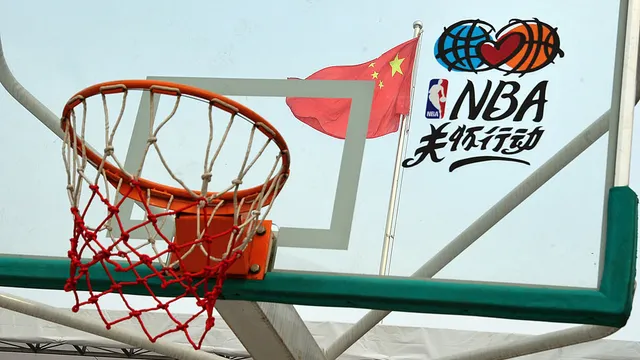
NBA executive struggles with questions on finances tied to China
2025-05-06 17:55- Senator Blackburn questioned NBA's relationship with China during a congressional hearing.
- Koenig was hesitant to disclose financial details regarding the NBA's investments in China.
- Concerns about the NBA's commitment to free speech and human rights were raised.
Express your sentiment!
Insights
In the United States, the ongoing relationship between the NBA and China was a focal point during a congressional hearing on May 5, 2025. Senator Marsha Blackburn of Tennessee questioned NBA executive Bill Koenig about the league's ties to China. This conversation arose from a tense incident in October 2019, when Daryl Morey, the general manager of the Houston Rockets, tweeted in support of pro-democracy protests in Hong Kong, leading to a halt in NBA broadcasts on Chinese state-run television. Over time, this event severely strained the NBA's relations with China, leading to substantial financial losses as viewership dramatically declined. During the hearing, Blackburn pressed Koenig for specific information regarding the NBA's financial dealings and television rights in China, as well as how much team owners have invested there. Koenig's responses were evasive, indicating that the NBA has a long history in China but refusing to disclose precise financial terms. This lack of transparency raised concerns about the NBA's commitment to uphold human rights and free speech, particularly in light of past challenges the league has faced over its relationship with the Chinese government. The conversation reflects a delicate balancing act for the NBA, as its substantial financial interests in China conflict with American values surrounding freedom of speech. Despite the hardships endured in the aftermath of Morey's tweet, the NBA seems intent on restoring a partnership with China, with discussions of resuming games scheduled for 2024. Koenig's assurance that freedom of speech is among the NBA's core values, however, drew little confidence from Senator Blackburn, who expressed skepticism about the NBA's adherence to these principles in light of the geopolitical landscape. The NBA’s evolution in its relationship with China illustrates the complex interplay of sports, business, and political ideologies. As leagues increasingly look to grow their markets overseas, issues like human rights and freedom of expression may continue to be sidelined. The congressional hearing spotlighted the necessity for transparency from major sports organizations regarding their financial interests, especially in nations with controversial political climates, and posed significant questions about their ethical responsibilities in international markets.
Contexts
The NBA has established a significant relationship with China over the past few decades, which has been characterized by mutual interest in fostering basketball as a major sport within the country. This relationship began to take shape in the 1980s, as the NBA sought to expand its global reach. The NBA's strategic initiatives included organizing exhibitions, broadcasting games, and developing partnerships with local Chinese companies. The correlation between the rising popularity of basketball in China and the NBA's innovative marketing strategies has proven to be successful, leading to a burgeoning fanbase that has embraced the sport and its stars such as Yao Ming, who became a cultural ambassador for the NBA and helped solidify the league's presence in China. By the early 2000s, NBA broadcasts reached millions of households in China, and the league further capitalized on this growing interest through a series of initiatives, including the establishment of training camps and grassroots programs aimed at developing Chinese talent. With the introduction of China’s own Basketball Association League, the NBA positioned itself as a key player in the development of basketball in the region, thus creating a synergistic dynamic where both players and fans were engaged. However, the relationship was not without its challenges, as it became entangled in political and social issues, particularly highlighted during incidents such as the 2019 controversy surrounding Houston Rockets General Manager Daryl Morey’s tweet in support of Hong Kong protests, which sparked widespread backlash from Chinese audiences and led to significant financial repercussions for the league. The NBA's response to the criticism was a tightrope walk; the league prioritized maintaining its market in China while trying to uphold its values, which further complicated its relationship with the Chinese government. This situation exposed the delicate balance that international companies must achieve when engaging with markets that operate under different cultural and political norms. Following this incident, the NBA initiated dialogues to remedy the relationship and worked diligently to rebuild its presence in China, knowing the vast potential both economically and socially. Despite the challenges, the relationship remains crucial as the NBA continues to tap into China's large youth demographic, hoping to link American basketball culture with Chinese participation and enthusiasm. Moving forward, it is essential for the NBA to navigate the geopolitical landscape with care, as both sporting and business advantages are at stake. Leveraging its star players and utilizing digital platforms will be key for continuous engagement with Chinese fans, who are eager to connect with the NBA. Recent investments in broadcasting rights, collaborations with local brands, and increased visibility for both games and merchandise all hint that the NBA is committed to a long-term investment in the Chinese market, all while maintaining the resonance of basketball culture globally. The intertwining of sports, culture, and politics in this context marks an evolving narrative that is essential to understanding the future of the NBA's international relations, especially with such a dynamic and pivotal market as China.